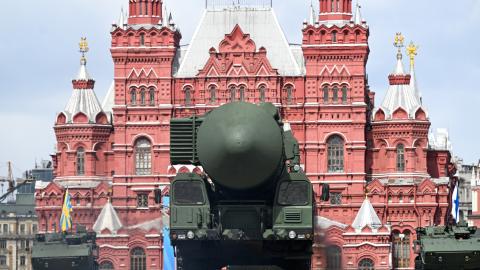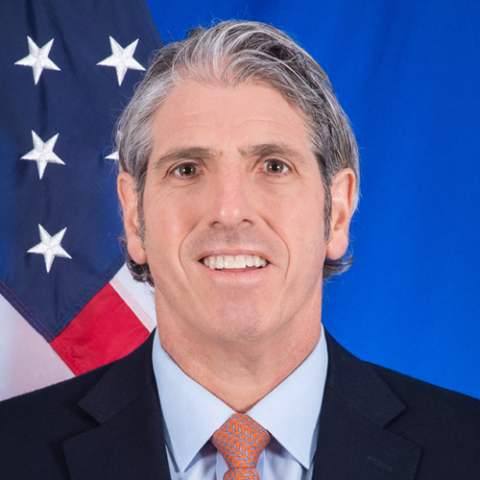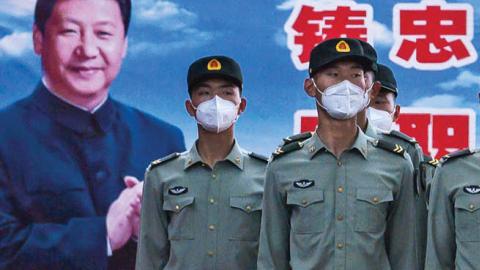Nearly 18 months after word of a deadly new virus began leaking out of Wuhan, China, the Chinese government’s response remains fundamentally hostile to international cooperation and transparency. Despite hundreds of offers of assistance, polite diplomatic entreaties, and demands for access to data by governments and health authorities across the globe, the world still knows far too little about COVID-19’s origin. As in a Dali painting, the clocks have melted but time has not stood still.
China’s initial silencing and censoring of its doctors and scientists, followed by misinformation about COVID-19’s dangers—especially denials concerning the virus’s ability to be spread human-to-human, invisibly and asymptomatically—helped cost the world trillions of dollars and millions of lives.
Whether one believes COVID-19 originated in a zoonotic host, a bat cave, a frozen food shipment, or a Wuhan lab’s dangerous “dual-use” research supporting undeclared bioweapons programs, the world needs answers from the Chinese Communist Party. These are answers Beijing won’t provide unless it faces a high price for refusing.
For the good of public health and international security, the Biden administration and the Congress can unite in a coordinated, long-term response.
Immediate steps by the Biden administration could include:
1. Cease funding for dangerous research: The Biden administration should completely reinstate the Obama administration’s ban on dangerous gain-of-function research, which was never sufficiently enforced in cases involving Chinese government labs.
2. Enforce treaty compliance: The secretary of state should address China’s violations of the International Health Regulations, especially its failure to respond to consultations and to share data among treaty members—a fundamental requirement. Beijing’s military programs need to be verified as complying with the peaceful purposes clause of the Biological Weapons Convention.
3. Sanctions: The secretary of the treasury and the secretary of state should begin investigating formal sanctions against the Wuhan Institute of Virology, the Chinese Academy of Sciences, and their networks of commercial entities for engaging in undeclared, classified biological weapons research and development for the Chinese military, in possible violation of US Presidential Executive Order 13382 on WMD proliferation.
4. Responsible pandemic preparedness: Rather than continuing to fund EcoHealth Alliance’s failed programs to try to predict the next pandemic, the administration should adopt a better strategy, such as establishing a public-private partnership to develop and deploy a global network of bio-threat detection sensors, possibly centered around the Chan Zuckerberg BioHub and IDseq Initiative. China would be expected to be a founding plank holder for this international bio-sensing network, as this initiative’s purpose is to share data akin to weather prediction and seismology joint detection, prediction, and coordination. At least we would get the benefit of much earlier warnings of natural or manmade disease outbreaks from this epidemiological “open skies” initiative.
While the Biden administration can take immediate, temporary measures to respond, the responsibility for creating a long-term response to the COVID-19 debacle lays with the Congress:
1. Independent bipartisan expert commission: Congress can establish a fully empowered and politically independent investigative commission to review the origin of the COVID-19 outbreak. The commission’s mandate would be to decisively get to the bottom of what happened, why it occurred, and assign responsibility to foreign actors for criminal negligence or other malign actions in reaction to the pandemic, investigate why America's biodefenses failed leading up to the pandemic, and provide recommendations on how to prevent the reoccurrence of a catastrophic pandemic.
The commission’s composition should ensure an evenly distributed mixture of current or former Democratic and Republican members of the House of Representatives and the Senate with public health, medical, legal, commerce, and a national security background. The staff of the commission should be similarly balanced and be fully vetted and cleared.
The commission should be granted subpoena power and closely coordinate with the relevant oversight committees of the House and Senate to ensure that those with legislative authority can quickly operationalize commission recommendations, as appropriate.
Such a commission would need full access to all federal medical and public health facilities, public health agencies, intelligence, and law enforcement agencies; state and municipal authorities; diplomatic agencies and international organizations; and both public and private sector actors deemed applicable by the commission.
As a counterweight to the WHO, this commission could provide an objective analysis of COVID-19’s origins, including both possible natural zoonotic and lab-associated origins. To highlight future US vulnerabilities, it could also include an all-source analysis of China’s gain-of-function research activities and programs related to viruses, including classified R&D and military strategy and policy toward synthetic biology and viral BW capabilities. The effort should encompass a comprehensive reckoning to strengthen and improve the effectiveness of such multilateral mechanisms and non-proliferation regimes as the International Health Regulations, the Biological Weapons Convention, and the Australia Group, upon which we depend for timely assurances and information disclosures from States Parties. Such an effort would need to start with an understanding of the perils of “dual use” technologies and a clear-eyed risk assessment building upon the National Academy of Sciences’ 2018 study, “Biodefense in the Age of Synthetic Biology.”
2. Curb dual-use abuse: Examine revamping statutory and administrative nonproliferation sanctions regimes—from EO 13383 to the Iran, North Korea, Syria Nonproliferation Act—to make them more effective in addressing and targeting the activities that support synthetic dual-use technologies that can be weaponized. Congress could also examine the criminal code, including the War Crimes Act, to enhance prohibitions on US persons engaging in such activities and protections for US citizens from being subject to the depredations of grey zone biowarfare.
3. Sanctions: Amend the Chemical and Biological Weapons Control and Warfare Elimination Act to impose sanctions on individuals, entities, government entities, and parastatals that have engaged in gross or significant negligence with respect to the maintenance of their biological facilities and/or the deliberate withholding of information in response to a significant event, beginning with the Wuhan Institute of Virology and the Chinese Academy of Sciences. Rather than utilizing the criteria in the legislation for specified use, a parallel system should be created for the application of sanctions in two phases, allowing remedial action to be taken by the state during a specified period after determination by the administration that a biological or chemical event has taken place. The chairmen of the House Foreign Affairs Committee and of the Senate Foreign Relations Committee, respectively, should retain the ability to mandate the initiation of an investigation to determine whether a significant event has taken place and whether it was the result of gross or significant negligence on the part of the foreign government or associated entity.
4. Civil litigation: Support civil claims against the PRC if that government does not provide substantive cooperation, including direct access to physical evidence, within a specified timeframe. Congress could empower civil litigants to seek compensatory damages against PRC individuals, agencies or instrumentalities whose conduct in connection with the development and spread of COVID-19 was grossly negligent or intentional. Congress would likely have to create or expand a statutory exception within the Foreign Sovereign Immunities Act to ensure that US federal courts would have jurisdiction over both the substantive liability claims and any judgment enforcement proceedings against the assets in the US of PRC individuals, agencies or instrumentalities (and any person or entity owned or controlled by, or successors to them) that are directly or indirectly responsible.
There is an opportunity for a bipartisan, bicameral initiative to establish a 21st-century framework for defending the United States and international partners against the prospect of another devastating pandemic. We cannot afford further impunity by Beijing and passivity from Washington as we enter what may be a century of synthetic biological adventurism and potential biowarfare.
About the Authors
David Asher
David Asher is a senior fellow at Hudson Institute. He has advised the US government on countering money laundering, terrorism financing, and sanctions-evasion schemes as well as campaigns to undermine nation-state and terrorist adversaries. He has developed and conducted whole-of-government investigations into international issues involving nuclear, chemical, and biological weapons development and proliferation. Over the last 25 years, he has played a senior role in economic and financial pressure campaigns involving terrorist organizations, drug cartels, and weapons proliferation networks. Most recently, in 2020 he served at the State Department, advising and supporting investigations into nuclear biological and chemical weapons proliferation and development issues. At State, he spearheaded a task force for the Office of the Secretary looking into the origins of COVID-19 and the role of the Chinese government in its development.
Thomas DiNanno
Thomas DiNanno is an adjunct senior fellow at Hudson Institute. He formerly served as acting assistant secretary of state for arms control verification and compliance from May 2019 to January 2021, and before that, as deputy assistant secretary of state for defense policy, emerging threats, and outreach in the Arms Control, Verification and Compliance Bureau. Previously, Mr. DiNanno was assistant administrator at the Department of Homeland Security’s Federal Emergency Management Agency, where he oversaw nearly $5 billion in counter-terrorism programs and national preparedness initiatives. Mr. DiNanno served as senior fellow for homeland security and critical infrastructure protection at the International Assessment and Strategy Center from 2008-2017. From 2004-2007, Mr. DiNanno served as deputy assistant secretary for critical infrastructure protection at the US Department of Homeland Security, where he was responsible for homeland security initiatives to identify and protect the nation’s critical infrastructure and implement several executive orders and legislative initiatives.
David Feith
David Feith is an adjunct senior fellow at the Center for a New American Security and a former US deputy assistant secretary of state for East Asian and Pacific affairs. At the Department of State from 2017 to 2021, David helped create the US Indo-Pacific Strategy and reorient US policy toward China and Asia. As deputy assistant secretary in the Bureau of East Asian and Pacific Affairs, he oversaw the Offices of Multilateral Affairs and Regional and Security Policy. From 2017 to 2019, David served as a member of the secretary of state’s policy planning staff, advising on relations with China and countries across the Indo-Pacific region. Before that, he was an editorial writer for the Wall Street Journal in Hong Kong, an op-ed editor for the Journal in New York, and an assistant editor at Foreign Affairs magazine.
Miles Yu
Miles Yu is a senior fellow at Hudson Institute. He is also a professor of East Asia and Military/Naval History at the United States Naval Academy in Annapolis, Maryland. Dr. Yu joined the Trump administration and served as the China policy adviser to Secretary of State Mike Pompeo. He is a visiting fellow at the Hoover Institution as a member of the Military History/Contemporary Conflict Working Group. From 2011-2016, he wrote the weekly column “Inside China” for the Washington Times. Since 1996, he has been an editorial consultant to Radio Free Asia, and a contributor to various media outlets including the Wall Street Journal and PBS News Hour.
Matthew Zweig
Matthew Zweig is a senior fellow at FDD. From July 2019 to December 2020, Matt served as the senior sanctions advisor in the Office of the Special Representative for Syria Engagement. He worked with bureaus across the State Department, interagency partners, multinational counterparts, and others to help implement the anti-Assad economic pressure elements of the administration’s Syria strategy. From 2001 to 2018, Matt served on the House Foreign Affairs Committee, including for more than 10 years as Senior Professional Staff, where he was responsible for various aspects of sanctions and illicit finance policy.
Photo Caption: Soldiers of the People's Liberation Army's Honour Guard Battalion wear protective masks as they stand at attention in front of photo of China's president Xi Jinping at their barracks outside the Forbidden City, near Tiananmen Square, on May 20, 2020 in Beijing. (Kevin Frayer/Getty Images)



















